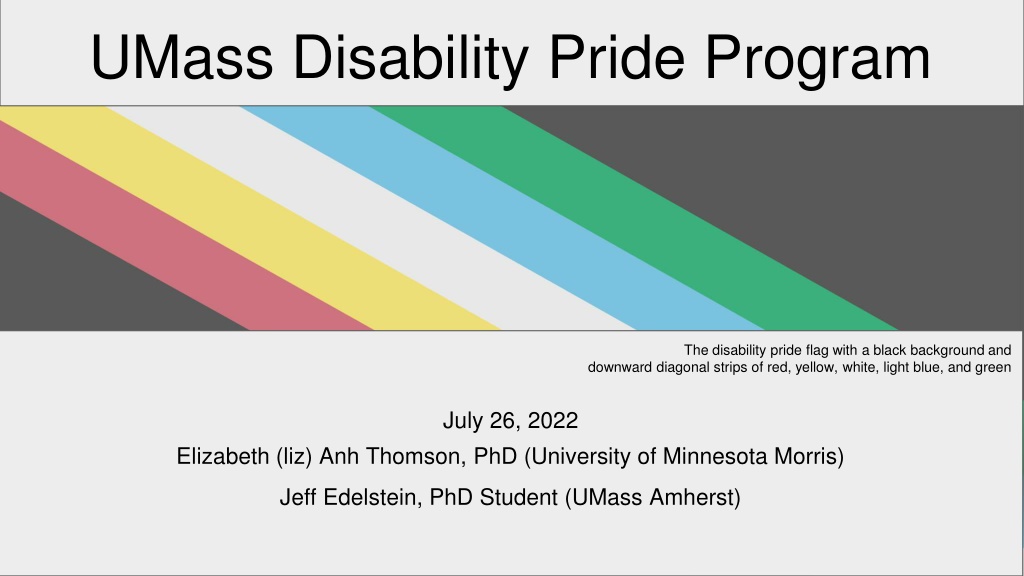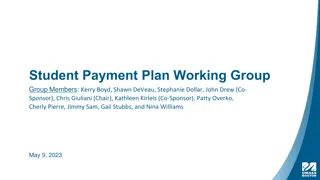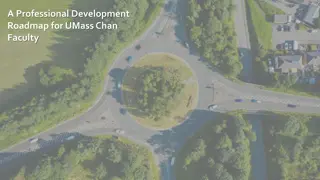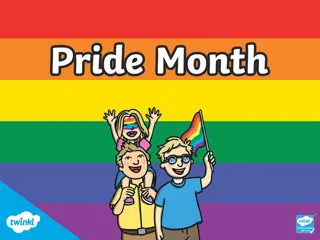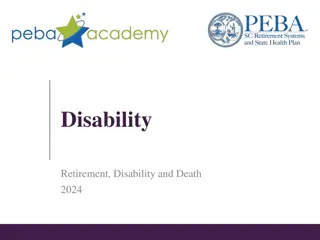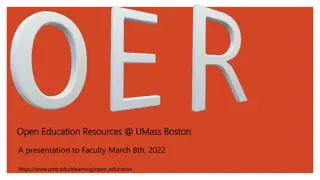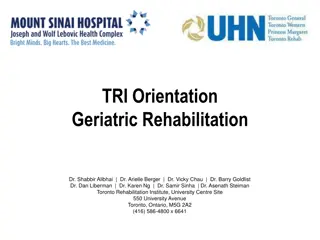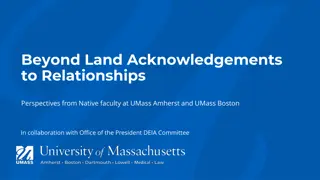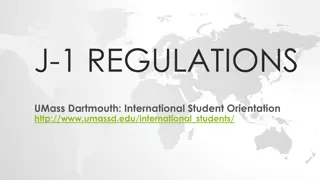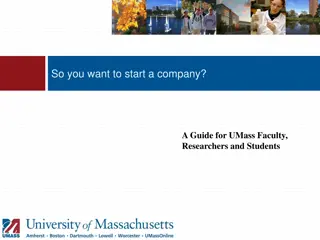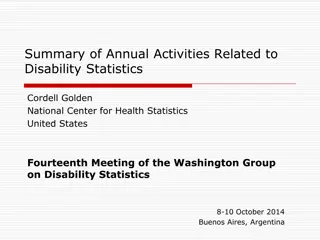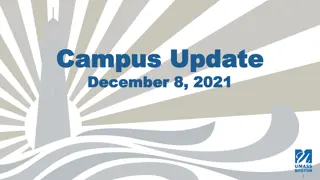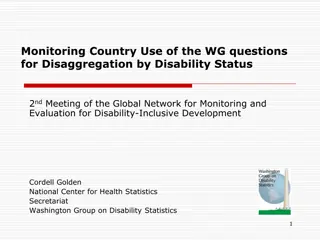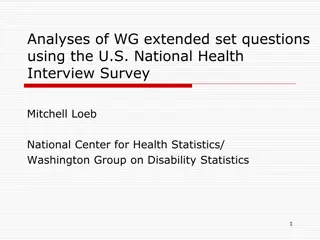UMass Disability Pride Program Session Overview
UMass Disability Pride Program session covers grounding assumptions, central terms, and concepts related to disability pride, ableism, and models of disability. The session includes introductions, explores person-first and identity-first language, and provides recommended resources for further understanding.
Download Presentation

Please find below an Image/Link to download the presentation.
The content on the website is provided AS IS for your information and personal use only. It may not be sold, licensed, or shared on other websites without obtaining consent from the author. Download presentation by click this link. If you encounter any issues during the download, it is possible that the publisher has removed the file from their server.
E N D
Presentation Transcript
UMass Disability Pride Program The disability pride flag with a black background and downward diagonal strips of red, yellow, white, light blue, and green July 26, 2022 Elizabeth (liz) Anh Thomson, PhD (University of Minnesota Morris) Jeff Edelstein, PhD Student (UMass Amherst) 1
Accessibility Read all text aloud Describe all images Use plain language and visuals Slides are numbered High contrast colors Be mindful of our rate of speaking Live captioner ASL interpreters Slides are caption friendly Slide deck double checked for access 2
Grounding Assumptions We can hold multiple things at once. Being pleased and proud of accomplishments, disability pride, and still challenge ableism at the university. Disabled people/people with disabilities contribute and have contributed to the academy in meaningful ways. Disability is part of diversity, equity, and inclusion (DEI) work. Those in attendance today come from a wide variety of positions of power and privilege around the university 3
Session Overview Introductions Grounding Assumptions Central Terms and Concepts Person First and Identity First Language Ableism, Academic Ableism, and Internalized Ableism Brief Overview of Models of Disability Panel Discussion Questions Recommended Resources 4
Introductions Jeff Edelstein (he/they) Elizabeth (liz) Anh Thomson (they/them) Indoors, close up headshot of a a dark-skinned Vietnamese gender non-conforming person smiling with shaved black hair, charcoal rimmed glasses, and black eyes. They are wearing a beige sweater with a loose collar. Indoors, a white, bearded, masculine-presenting person with short, brown curly hair is shown smiling. They are wearing a black suit jacket, blue dress shirt, and tie with a gold, blue, and black patterning 5
Person-First and Identity-First Language Language is a social construct, comes with histories, and is always changing. Person-first language example: He is a person with a disability. Identity-first language example: He is a disabled person. Some people have a strong opinion on which to use for themselves. Some alternate between the two. A recommendation is to use the language the person is using. 7
Ableism, Academic Ableism, and Internalized Ableism Ableism - the discrimination of and social prejudice against people with disabilities based on the belief that typical abilities are superior (accessliving.org) Academic Ableism - the systemic and individual way ableism shows up in the academy (Dolmage, 2017) Internalized Ableism - how a disabled person absorbs ableism; can have negative thoughts about disability; limits themselves 8
Brief Overview of Selected Disability Models Green graphic of a medical clipboard with a circle with a cross inside it Green graphic of a wheelchair user going up a ramp Green graphic of two large nondescript people on the left of a plank; two smaller nondescript people standing on two blocks on the right of the plank; the plank is balanced with an equal sign enclosed by dotted lines above it Social Justice Model Social Model Medical Model 9
Q & A 11
Recommended ResourcesOpen Access Books & Articles Open Access Books Academic Ableism by Jay T. Dolmage Ableism in Academia by Nicole Brown & Jennifer Leigh Articles (May Require Institutional Log-in) Make It Safe For Employees to Disclose Their Disabilities, Harvard Business Review How Disabled and Neurodivergent Faculty Live, Inside Higher Ed Colleges Should Make it OK for Faculty to Disclose Disabilities, Inside Higher Ed Stop Telling Us You Hide it So Well, Inside Higher Ed In Fight Against Ableism, Students Create Centers of Their Own, The Chronicle of Higher Education The Neglected Demographic: Faculty Members with Disabilities, The Chronicle of Higher Education 12
Recommended ResourcesOrganizations & Blogs Organizations Autistic Self-Advocacy Network Autism Women and Non-Binary Network Sins Invalid Rooted in Rights ADA National Network Massachusetts Office on Disability Alliance Against Ableism UMass Allies for Illness and Disability Access (UMAIDA) Blogs Autistic Hoya by Lydia X.Z. Brown Leaving Evidence by Mia Mingus Planet of the Blind by Steve Kuusisto Brown Star Girl by Leah Lakshmi Piepzna-Samarasinha . 13
Recommended ResourcesPodcasts & Videos Podcasts Disability After Dark (NSFW) by Andrew Gurza Disability Visibility by Alice Wong Reid My Mind by Thomas Reid The Accessible Stall by Kyle Khachadurian and Emily Ladau Videos Crip Camp: A Disability Revolution (Documentary; Available on YouTube) 14
Contact Information Elizabeth (liz) Anh Thomson, PhD (University of Minnesota Morris) Email: lthomson@morris.umn.edu Jeff Edelstein, PhD Student (UMass Amherst) Email: jedelstein@umass.edu; jeffrey.edelstein@umb.edu Twitter: @Jeff_Ed_ Thank you! 15
